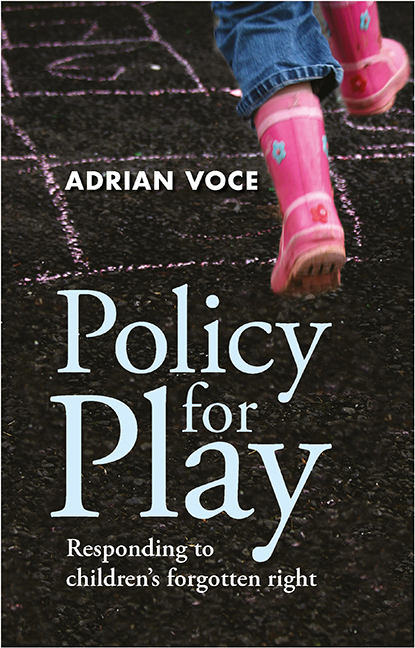Book contents
- Frontmatter
- Dedication
- Contents
- Who’s who
- About the author
- Preface
- Foreword
- Prologue
- Introduction ‘To respect, protect and fulfil’
- one ‘To play and to dream’ • Restoring play to the heart of the campaign for children’s rights
- two ‘For a change’ • Finding the evidence for play policy
- three ‘Advocates for play’ • Playwork’s place at the heart of the play movement
- four ‘New opportunities’ • Lottery funding and the beginnings of public play policy
- five ‘A vital and vibrant city’ • How devolved government in London set a benchmark for play policy
- six ‘Making the case’ • The call for a national play strategy
- seven ‘Things to do, places to go?’ • How play was overlooked by children’s services reform
- eight ‘Getting serious’ • The national play review
- nine ‘Lottery millions’ • The Children’s Play Initiative
- ten ‘Dirt is good’ • The Play England project
- eleven ‘The best place in the world’ • The Play Strategy for England
- twelve ‘Playbuilders’ • Breaking the mould of the public playground
- thirteen ‘Everyday adventures?’ • Austerity brings an end to play policy in England
- fourteen ‘Skylarks and canaries’ • The legacy of the Play Strategy
- fifteen ‘Children now’ • Responding to children’s right to play: conclusions and recommendations
- Epilogue
- References
- Index
fifteen - ‘Children now’ • Responding to children’s right to play: conclusions and recommendations
Published online by Cambridge University Press: 08 March 2022
- Frontmatter
- Dedication
- Contents
- Who’s who
- About the author
- Preface
- Foreword
- Prologue
- Introduction ‘To respect, protect and fulfil’
- one ‘To play and to dream’ • Restoring play to the heart of the campaign for children’s rights
- two ‘For a change’ • Finding the evidence for play policy
- three ‘Advocates for play’ • Playwork’s place at the heart of the play movement
- four ‘New opportunities’ • Lottery funding and the beginnings of public play policy
- five ‘A vital and vibrant city’ • How devolved government in London set a benchmark for play policy
- six ‘Making the case’ • The call for a national play strategy
- seven ‘Things to do, places to go?’ • How play was overlooked by children’s services reform
- eight ‘Getting serious’ • The national play review
- nine ‘Lottery millions’ • The Children’s Play Initiative
- ten ‘Dirt is good’ • The Play England project
- eleven ‘The best place in the world’ • The Play Strategy for England
- twelve ‘Playbuilders’ • Breaking the mould of the public playground
- thirteen ‘Everyday adventures?’ • Austerity brings an end to play policy in England
- fourteen ‘Skylarks and canaries’ • The legacy of the Play Strategy
- fifteen ‘Children now’ • Responding to children’s right to play: conclusions and recommendations
- Epilogue
- References
- Index
Summary
The story of the Play Strategy for England, and our overview of some of the key ideas and research on children’s play and how it is constrained in the modern world, suggests that no society that values human rights or wants a dynamic, sustainable economy can afford to neglect play. A public realm – space, services and culture – that supports the basic needs of all its people must treat the innate and expressed desire of all children to play with at least as much seriousness as it does their anticipated future needs as employable adults.
Indeed, the evidence strongly indicates that these needs are complementary. How, indeed, could they not be? If playing stimulates brain growth, adaptability and emotional intelligence; engenders resilience and creative initiative, develops the child’s sense of self and relationship and enables him or her to practice assessing and navigating risk, how could it not be a fundamentally important aspect of the growth and development that will equip him or her to do well in life and be a valuable member of society? To ask whether children play because of the deferred benefits they seem to derive from it, or simply because it’s the best fun they can have, is the wrong question. The ‘play for its own sake’ versus ‘play for positive outcomes’ argument is a false dichotomy. No child has ever played to improve their future life chances, but there is plenty of evidence to suggest that, in playing, they do just that. From a policy perspective, however, the distinction is crucial.
Although what we know about children’s play does not in fact support the unquestionable assertion that it is or must always be ‘self-directed or intrinsically motivated’ (there is too much evidence of the transpersonal, communal nature of much playing for that statement to stand unchallenged), we also know that the optimum conditions for playing are those which support and respond to children’s own initiative, provide them with resources and space to manipulate and explore and give them permission to be spontaneous and expressive. The real question to ask is to what extent our expenditure on services and spaces for children – and on housing, streets, parks and public spaces for their communities – affords them such opportunities.
- Type
- Chapter
- Information
- Policy for PlayResponding to Children's Forgotten Right, pp. 149 - 156Publisher: Bristol University PressPrint publication year: 2015



